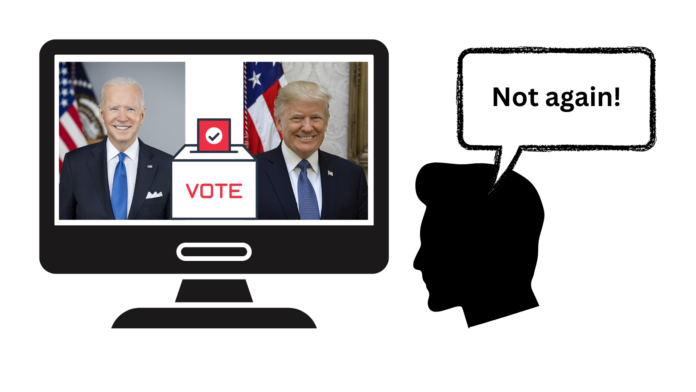
Content warning: The following article contains quotes with xenophobia.
From criminal and civil investigations to the invasion of Gaza and questions about their age, Americans will once again choose between Joe Biden and Donald Trump, each with their own political and personal baggage.
The latest Siena College poll shows Trump leading 48 to 44 per cent among likely voters, giving the 45th president the upper hand in five swing states.
“Both candidates are weak,” said Jamie Gillies, professor of communications at St. Thomas University. “The likely scenario is that we’re going to have a decline in voter turnout in November simply because so many people will just choose not to even bother to vote.”
Gillies published a book in 2022 about the 2020 Presidential Election and is teaching a course on the upcoming American elections in the fall of 2024.
To him, the main reason behind Biden’s unpopularity is his age. According to the same Siena College poll, the majority of Biden’s 2020 voters think the 81-year-old is “too old” to be president.
However, Gillies added that another weakness Biden has is that he is no longer the “anti-Trump” candidate, but rather the incumbent.
“Last time, he was the anti-Trump and he ran successfully against that, not really defining himself as a ‘hope and change’ kind of President like Barack Obama or even Bill Clinton,” he said.
Gillies also said Biden’s support for the invasion of Gaza has “alienated parts of the coalition” that got him into the Oval Office in 2020, including younger voters, Arabs and Muslims.
On Oct. 10, Biden pledged his support to Israel’s Prime Minister Benjamin Netanyahu, saying “there are moments in this life, and I mean this literally, when the pure unadulterated evil is unleashed on this world. The people of Israel lived through one such moment this weekend.”
As for Black and Hispanic voters, Biden can no longer rely on their vote as he did four years ago, which presents “an even bigger issue” in swing states like Georgia.
On the other hand, Trump is in deep legal trouble, having 91 charges across four criminal cases. Gillies said this doesn’t stop loyal Trump supporters, but it might affect the average American.
“The most pulled question in this election is not so much what are the most important issues … but whether you support a presidential candidate who has been charged with so many crimes,” he said.
“It’s going to be interesting to see if Trump can convince any more people, undecided voters, middle of the road voters, Republicans who left the party because of Donald Trump, whether they’ll come back and hold their nose and vote for him.”
Amid the campaign, Trump has ramped up his key issues, the economy and immigration, with him vocalizing concerning ideas about the latter topic. At a rally in Dayton, Ohio, Trump called undocumented migrants “animals,” something he has done in the past.
“If I had prisons that were teeming with MS-13 and all sorts of people that they had to take care of for the next 50 years. If you call them people, I don’t know if you call them people,” said the former president.
Gillies is eager to teach a course about American elections during an election year, as students will get to “watch it unfold.” He got to teach this class in 2020, but due to the pandemic, all the classes were online.
“I hope it’s even better this time around because, again, we’re actually in the classroom.”
